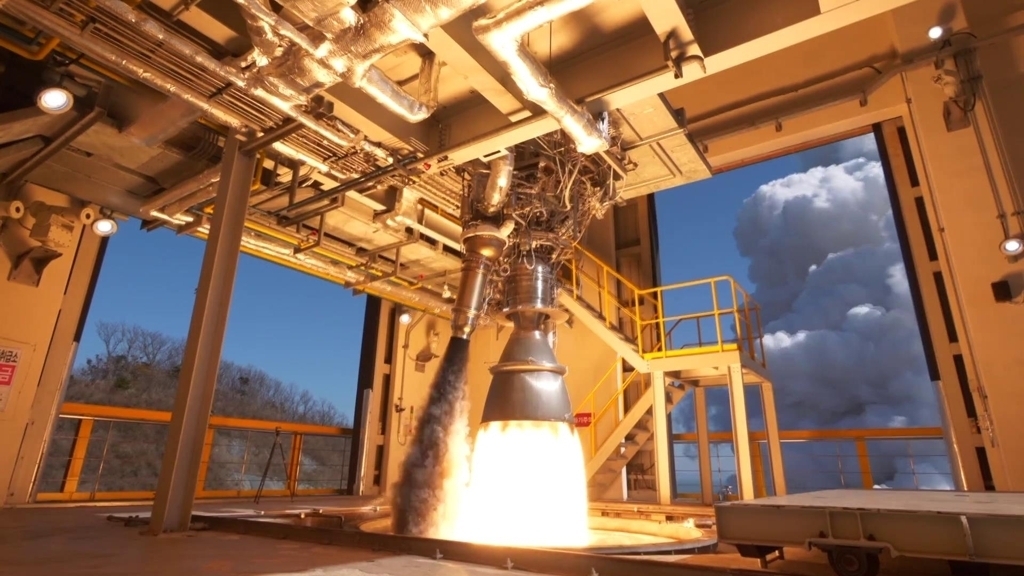S. Korea seeks unfettered access to space tech after ban lifted
Experts say lifting cap US put on Korea’s missile program could bolster its space power
By Choi Si-youngPublished : May 27, 2021 - 18:09

South Korea is now free to flex its muscles in space, as it was cut loose from a Korea-US missile pact that has long capped Seoul’s missile program and space reach, experts said Thursday.
At last week’s Seoul-Washington summit, the two allies agreed to abolish the 1979 pact that banned medium and long-range ballistic missiles. The US reversed the decision in what many see as an effort to reel in South Korea to counter China and North Korea.
Military experts hailed the event, and space experts stressed that a spillover from military advances in missile technologies will benefit the space industry, which is looking to build homegrown space launch vehicles. Sharing technology know-how has not been feasible under the pact.
“What matters is that space engineers could now build on or borrow technology know-how from the military’s missile expertise. An intercontinental ballistic missile, for instance.” said Cho Jin-soo, a mechanical engineering professor at Hanyang University.
Seoul had been allowed to build missiles with a range of 800 kilometers and below. An ICBM has a minimum range seven times that distance, about 5,500 kilometers. The cap on the range was the remaining obstacle; the ban on solid fuel engines that go with ICBMs was lifted last year.
“Longer range missiles mean bigger engines, which requires more sophisticated technologies to deliver the missile,” Cho noted.
Cho said military experience in flying long-range missiles could help the country to develop better local space launch vehicles in the future, though he admitted that Korea has come a long way as an emerging space power without the military’s input.
Seoul, which launched its first space rocket carrying a scientific research satellite in 2013, is looking to secure a local launch vehicle. It is preparing to test launch a second space rocket in October this year and May next year. That is South Korea’s first domestically produced space rocket.
Other experts added Korea could build new space ties in the meantime. The government signed the Artemis Accords on Thursday as part of last week’s Seoul-Washington summit agreement. The pact is a US-led effort to deepen space exploration that aims to return humans to the moon by 2024.
“Our space exploration is gaining a new momentum with the missile ban gone and the new Artemis Accords,” a senior Cheong Wa Dae official said shortly after the summit.
Meanwhile, experts played down worries that Beijing and Pyongyang could fault Seoul for building advanced missiles. Park Won-gon, a professor of North Korean Studies at Ewha Womans University, said they would not press the issue because they have nothing to gain.
“North Korea is out of picture because it has a pack of missiles pointing at us. China has a wider range of missiles deployed. Who’s to blame us if we have all the same (missiles) on our own soil?”
By Choi Si-young (siyoungchoi@heraldcorp.com)
At last week’s Seoul-Washington summit, the two allies agreed to abolish the 1979 pact that banned medium and long-range ballistic missiles. The US reversed the decision in what many see as an effort to reel in South Korea to counter China and North Korea.
Military experts hailed the event, and space experts stressed that a spillover from military advances in missile technologies will benefit the space industry, which is looking to build homegrown space launch vehicles. Sharing technology know-how has not been feasible under the pact.
“What matters is that space engineers could now build on or borrow technology know-how from the military’s missile expertise. An intercontinental ballistic missile, for instance.” said Cho Jin-soo, a mechanical engineering professor at Hanyang University.
Seoul had been allowed to build missiles with a range of 800 kilometers and below. An ICBM has a minimum range seven times that distance, about 5,500 kilometers. The cap on the range was the remaining obstacle; the ban on solid fuel engines that go with ICBMs was lifted last year.
“Longer range missiles mean bigger engines, which requires more sophisticated technologies to deliver the missile,” Cho noted.
Cho said military experience in flying long-range missiles could help the country to develop better local space launch vehicles in the future, though he admitted that Korea has come a long way as an emerging space power without the military’s input.
Seoul, which launched its first space rocket carrying a scientific research satellite in 2013, is looking to secure a local launch vehicle. It is preparing to test launch a second space rocket in October this year and May next year. That is South Korea’s first domestically produced space rocket.
Other experts added Korea could build new space ties in the meantime. The government signed the Artemis Accords on Thursday as part of last week’s Seoul-Washington summit agreement. The pact is a US-led effort to deepen space exploration that aims to return humans to the moon by 2024.
“Our space exploration is gaining a new momentum with the missile ban gone and the new Artemis Accords,” a senior Cheong Wa Dae official said shortly after the summit.
Meanwhile, experts played down worries that Beijing and Pyongyang could fault Seoul for building advanced missiles. Park Won-gon, a professor of North Korean Studies at Ewha Womans University, said they would not press the issue because they have nothing to gain.
“North Korea is out of picture because it has a pack of missiles pointing at us. China has a wider range of missiles deployed. Who’s to blame us if we have all the same (missiles) on our own soil?”
By Choi Si-young (siyoungchoi@heraldcorp.com)









![[Graphic News] More Koreans say they plan long-distance trips this year](http://res.heraldm.com/phpwas/restmb_idxmake.php?idx=644&simg=/content/image/2024/04/17/20240417050828_0.gif&u=)
![[KH Explains] Hyundai's full hybrid edge to pay off amid slow transition to pure EVs](http://res.heraldm.com/phpwas/restmb_idxmake.php?idx=644&simg=/content/image/2024/04/18/20240418050645_0.jpg&u=20240419100350)







![[KH Explains] Hyundai's full hybrid edge to pay off amid slow transition to pure EVs](http://res.heraldm.com/phpwas/restmb_idxmake.php?idx=652&simg=/content/image/2024/04/18/20240418050645_0.jpg&u=20240419100350)

